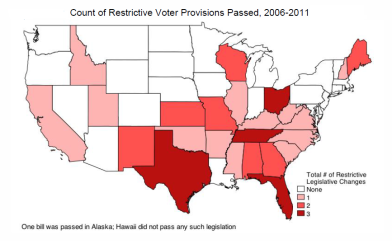Archive for December 2013
Targeting the Right To Vote
 I’ve written about voting rights before, a topic that has become all the more urgent in the wake of recent efforts to restrict voting rights and the Supreme Court’s gutting of the Voting Rights Act. Keith Bentele and Erin O’Brien have a piece examining recent GOP efforts at adopting various voting barriers: Jim Crow 2.0? Why States Consider and Adopt Restrictive Voter Access Policies. (Full disclosure, Erin is a good friend from my doctoral program, and I provided feedback on the paper.) Their empirical findings are going to get the most attention, and they are certainly important. I’ll review them below. But the larger implications are important too, and since I fear these may get lost I want to discuss them more fully.
I’ve written about voting rights before, a topic that has become all the more urgent in the wake of recent efforts to restrict voting rights and the Supreme Court’s gutting of the Voting Rights Act. Keith Bentele and Erin O’Brien have a piece examining recent GOP efforts at adopting various voting barriers: Jim Crow 2.0? Why States Consider and Adopt Restrictive Voter Access Policies. (Full disclosure, Erin is a good friend from my doctoral program, and I provided feedback on the paper.) Their empirical findings are going to get the most attention, and they are certainly important. I’ll review them below. But the larger implications are important too, and since I fear these may get lost I want to discuss them more fully.
Inequality is a Problem: There is Too Little
 Talk about inequality is in the air. Everyone seems to agree it’s a problem, although a lot of people seem to offering the same old policy proposals to address it. It’s almost as if they are simply attaching what they already want to do to the rhetoric of today’s demands. But maybe the problem is that we misunderstand what exactly the problem of inequality is as far as elites are concerned.
Talk about inequality is in the air. Everyone seems to agree it’s a problem, although a lot of people seem to offering the same old policy proposals to address it. It’s almost as if they are simply attaching what they already want to do to the rhetoric of today’s demands. But maybe the problem is that we misunderstand what exactly the problem of inequality is as far as elites are concerned.
Speaking of which, Jonathan Cohn points us to this story by Scott Amey from the Project On Government Oversight
On the same day that the President spoke eloquently and fervently about the rising income inequality in the United States, the ever-contractor-friendly Office of Federal Procurement Policy (OFPP) in the Office of Management and Budget (OMB) increased the maximum amount of contractor compensation that can be charged to government contracts from a mere$763,029 per employee per year to what OFPP apparently considers a much more reasonable $952,308 per employee per year. This increase primarily affects the employees of the largest government contractors—most notably defense and information technology firms. So taxpayers are now on the hook for paying up to nearly $1 million for every one of these contractor executives or employees every year.
What is Politics? Easton, Stone and Claim Making
I don’t remember where it all started, but I’ve been unhappy with the concept of the decision as the central framework for political science for a long time. Very few political scientists, I should note, would say this is the case. They’d probably object to the idea that there is a central framework. Instead, they would likely focus on various different frameworks. But, being heterodox and inclined to see the biggest picture possible, it was clear to me there was a deep similarity among these different approaches. For one thing, there was so much political activity that was left out of this dominant framework, or dismissed or obscured. Of course, we might conclude that something that political actors think is important is not after investigating it, but to do so as a matter of definitions makes little sense.
Since I began developing my idea of ‘politics as a contest of claim making’ as an alternative, I find that idea all over political science, although rarely foregrounded. It seems the sort of banal point that is widely understood but rarely the basis for much explicit theorizing. But it does come up again and again. My task seems to be to call attention to it and explicate its implications.
